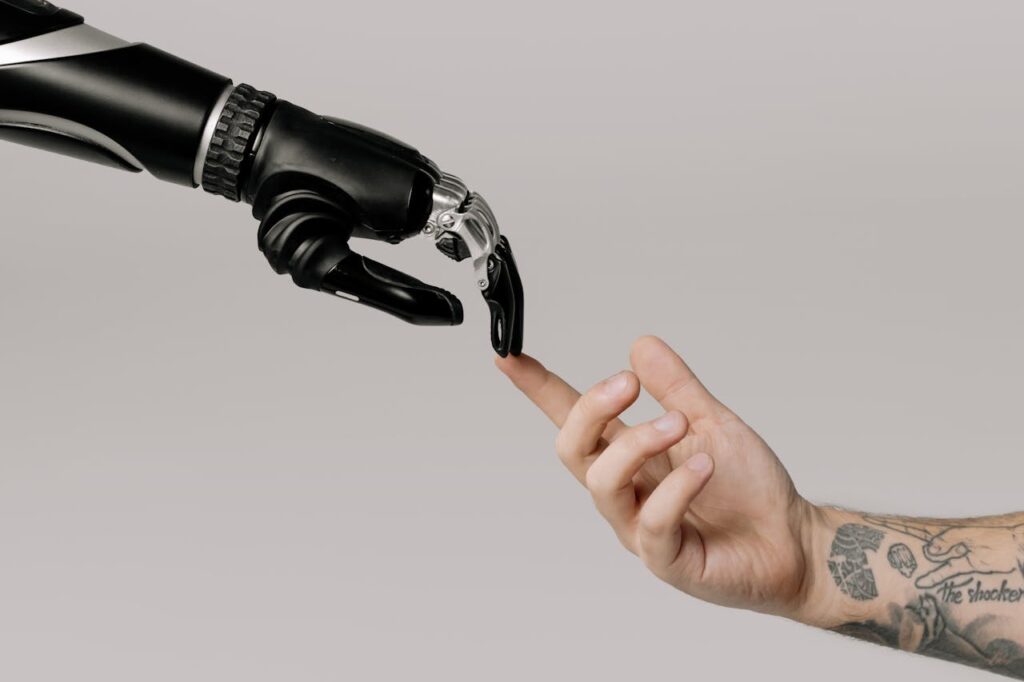In the early days after an amputation, every step matters. The body is healing, the mind is adjusting, and a person’s entire world is shifting. At this stage, prosthetic care must be gentle, precise, and deeply responsive to each user’s needs. Over the last few years, artificial intelligence (AI) and smart prosthetics have started to transform what early fit prosthetic solutions look like. These technologies are not just futuristic—they are practical tools that are already improving how people begin their journey with a prosthetic limb.
At Robobionics, we’ve been at the forefront of this change in India. We understand that early fit solutions are more than temporary fixes—they are the bridge between recovery and independence. With AI-driven tools, smarter limb designs, and real-time data tracking, we’re helping users move faster, heal safer, and feel more confident in their first steps.
Understanding Early Fit Prosthetics and Their Challenges
Before diving into the technology, it’s important to understand what early fit prosthetics are and why they matter so much. These are the first prosthetic limbs that users receive shortly after surgery, once the wound has healed but before the residual limb has fully stabilized.
The Role of Early Fit Devices in Recovery
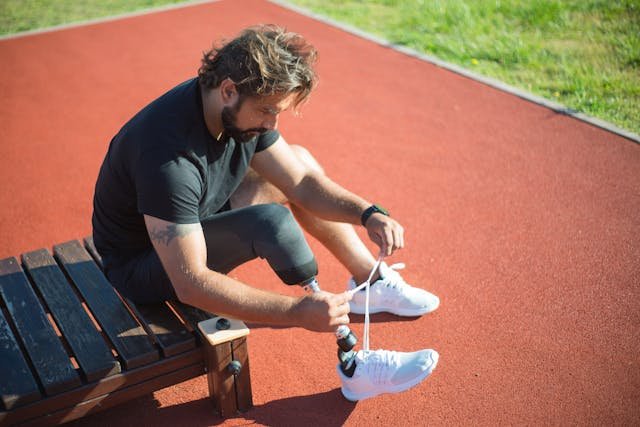
An early fit prosthetic plays a key role in shaping the recovery process. It helps reduce swelling, improve blood circulation, and prevent joint stiffness. It also allows the user to begin standing and moving, which protects muscle strength and balance. These early steps set the tone for everything that follows, including the success of the final prosthetic.
At Robobionics, we’ve seen how the right early prosthetic can dramatically improve outcomes. When users get to move early, they feel more hopeful. They also start to build strength and coordination that helps them adjust to a permanent limb more easily later.
The Difficulties in Fitting Early Devices
One of the biggest challenges with early fit prosthetics is that the limb is still changing. Swelling can go up and down. Skin may be sensitive. The shape of the residual limb isn’t final, so sockets need to adjust as healing continues. This makes it hard to design a socket that’s both snug and gentle.
Fitting too tightly can cause pain or injury. Fitting too loosely can cause instability and increase the risk of falls. Getting it “just right” is a delicate balance that requires constant attention, which is where smart technology can make a real difference.
Why Personalization Is So Important
No two limbs are the same. Even with identical surgeries, every person heals in their own way. That’s why early fit prosthetics can’t be one-size-fits-all. The best solutions are those that adapt in real time—responding to limb shape, skin sensitivity, pressure points, and walking patterns.
At Robobionics, we’ve built our early fit program around personalization. With the help of AI and smart sensors, we’re able to respond to what each user needs, not just what the average person might need.
How AI Is Changing Early Prosthetic Design
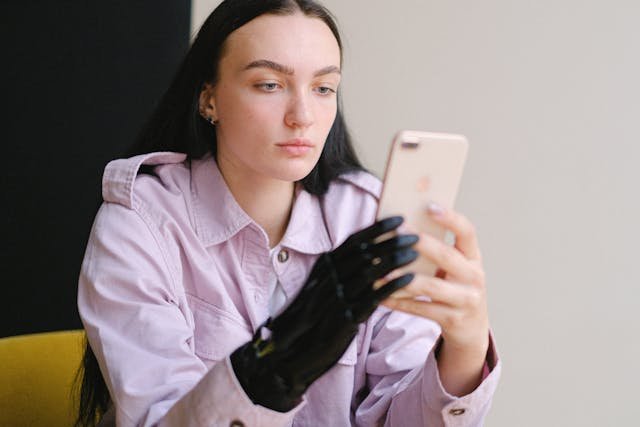
Artificial intelligence brings speed, precision, and prediction into the prosthetic design process. It takes the guesswork out of fitting and makes it easier to match the right design to the right person—faster and more accurately than ever before.
AI-Driven Socket Design for Better Comfort
In traditional socket design, a prosthetist uses measurements, molds, and experience to create a fit. But with AI, we can now scan the limb digitally and feed that data into advanced modeling software. This software predicts how the limb will change over time and suggests socket shapes that can adapt along with it.
This means fewer socket changes, less trial and error, and a much more comfortable experience from the start. The AI can also help identify pressure areas and avoid them in the socket shape, improving skin protection and reducing pain.
Robobionics uses 3D limb scanning and AI-powered modeling to build socket designs that are tailored to each user. These sockets are not just based on today’s shape—they are prepared for what the limb might look like tomorrow.
Predicting Limb Volume Changes for Proactive Fit
One of the hardest parts of early fitting is the constant change in limb volume. With every week, the limb might shrink or shift. AI can now help track these changes using data from sensors and user input, and even predict future changes.
With this knowledge, prosthetists can plan ahead. They can build in adjustability or schedule timely socket updates before discomfort occurs. This not only protects the user’s skin but also keeps the prosthetic feeling supportive and secure.
At Robobionics, we use AI tracking tools to help us know when a socket may need adjusting—often before the user even feels discomfort. This makes care proactive, not reactive.
Matching the Right Components to Each User
AI doesn’t just help with socket design. It also helps select the right foot, knee, or alignment for each user. Based on walking patterns, strength, age, and goals, AI can suggest combinations of prosthetic parts that give the best balance of support and flexibility.
This makes the first fitting more successful and helps the user get moving sooner with fewer changes. It also reduces trial time and speeds up the transition to a more stable walking pattern.
At Robobionics, our early fit systems are supported by AI that matches the components to the user’s daily life—not just their medical chart.
How Smart Prosthetics with Sensors Are Improving Early Rehab
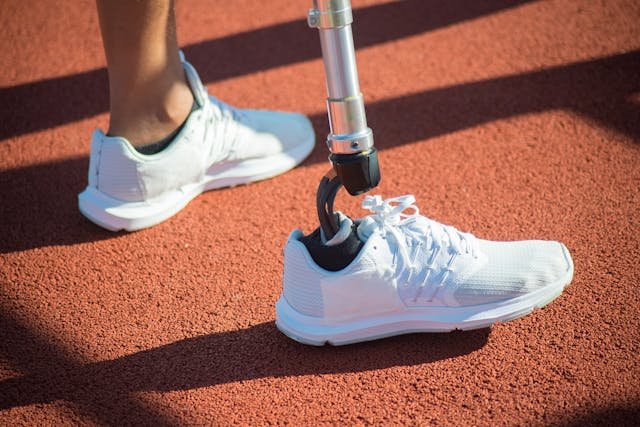
Smart prosthetics are not just about advanced materials or sleek design—they are about interaction. With built-in sensors and real-time feedback, these devices can collect data about how the user walks, where pressure is applied, and how the limb responds to movement. This level of detail has completely changed how early rehabilitation is managed, especially for new users.
Tracking Movement to Improve Balance and Gait
One of the most important goals in early prosthetic care is relearning how to walk. Most users have to train their bodies to find balance, shift weight correctly, and take steps without pain or strain. Smart prosthetics collect detailed information with each step. They can track how much pressure is placed on different areas, how quickly the foot moves, and how steady each step is.
With this data, therapists can fine-tune their rehab approach. They can see if the user is limping, leaning to one side, or favoring their sound limb. They don’t have to rely only on observation. Instead, they get real numbers that show how the body is moving.
At Robobionics, we use these smart systems during the early stages of prosthetic training. The feedback helps us guide users more precisely, which leads to faster and safer progress.
Making Real-Time Adjustments for Comfort and Fit
Sensors inside a smart prosthetic can also detect pressure and movement inside the socket. If one area is too tight or if the limb shifts inside the socket during walking, the system records this. Some devices can even adjust themselves automatically, loosening or tightening specific areas to improve comfort.
This kind of dynamic response is especially useful in the early phase when the residual limb is still healing and changing shape. Instead of stopping activity or waiting days for a clinic visit, the prosthetic responds in the moment, helping the user stay active and pain-free.
Robobionics offers smart liners and adjustable socket systems that respond to real-time input. These devices give our users the freedom to move without the fear of pressure injuries or instability.
Helping Users Learn Through Direct Feedback
Smart prosthetics can also connect to mobile apps or digital screens, showing users how they are moving. This makes rehabilitation more interactive. Instead of being told what to correct, users can see the difference themselves. They become active participants in their own progress.
This kind of engagement improves motivation. It turns walking practice into something measurable and encouraging. The user sees improvement not just in how they feel, but in what the data shows them. That sense of achievement is powerful during early recovery.
At Robobionics, we include app-based training and feedback tools for many of our early fit users. These systems support at-home practice, increase confidence, and bring clarity to every session.
How AI and Smart Systems Reduce Complications and Support Long-Term Success
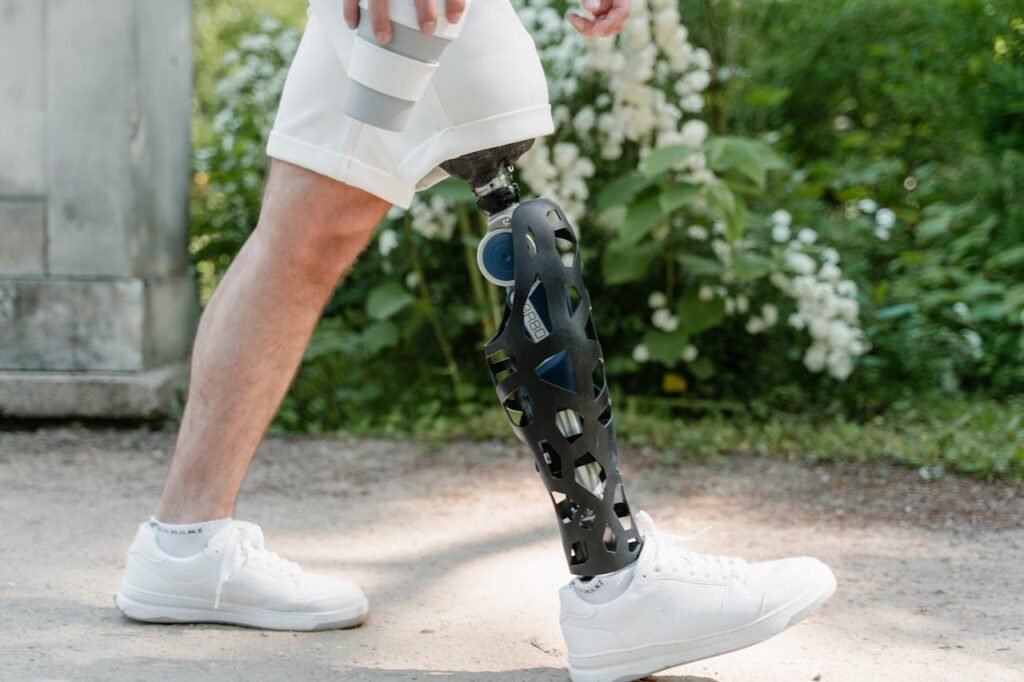
Starting prosthetic use early can speed up recovery—but it also comes with risks. The residual limb is still sensitive, and small mistakes in fit or movement can lead to pain, skin injuries, or delays. This is where AI and smart systems offer a huge advantage. By catching issues early and helping guide care in real-time, they make early fitting safer and more effective, setting up users for long-term success.
Preventing Skin Breakdown and Pressure Sores
One of the biggest concerns during early prosthetic use is pressure on the residual limb. If a socket presses too hard in one area or if the skin stays moist for too long, the result can be irritation or even open wounds. These kinds of skin issues can slow down recovery and may even stop someone from wearing their prosthetic for days or weeks.
Smart sensors can detect exactly where pressure is building up inside the socket. If the user is walking unevenly or if the limb is rubbing in a certain spot, the system alerts the user or care team right away. This allows for quick action, like adjusting the liner, changing socks, or modifying the socket—before skin damage happens.
At Robobionics, we use smart liners and pressure mapping tools during early fittings. This helps protect the skin while still allowing users to stay active and practice movement every day.
Reducing the Risk of Falls or Imbalance
Many users feel unsteady when they first start using a prosthetic. The muscles are still weak, and the brain is learning how to balance with a new limb. Small missteps can lead to falls, which can cause injury or loss of confidence.
AI systems inside smart prosthetics track balance, posture, and walking rhythm. If something looks off—like dragging a foot or taking uneven steps—the system can suggest changes or alert the therapist. Some advanced systems even adjust how the foot or knee responds, giving extra stability when needed.
Robobionics includes smart balance feedback tools in many of our early rehab programs. These tools help users walk more safely, whether they are in the clinic or at home practicing with support.
Supporting Faster, Smarter Decision-Making

When problems show up in prosthetic care, timing matters. The sooner the issue is spotted, the easier it is to fix. AI tools that track limb volume, step count, activity levels, and pressure make it easier for care teams to see the full picture. Instead of waiting for the user to report a problem, these systems often detect issues early—even before discomfort begins.
This kind of information allows prosthetists and therapists to adjust treatment quickly. It also means fewer clinic visits, fewer delays, and less stress for the user. The whole process becomes more efficient and responsive.
At Robobionics, we use data dashboards to keep track of each user’s journey. Whether someone is in a city or a small town, we can check in, adjust care, and offer support without missing a beat.
The Future of AI and Smart Prosthetics in India
India’s prosthetic care landscape is changing quickly. As more people seek advanced, affordable solutions, AI and smart prosthetics are making that future possible. These technologies are not just helping individuals recover faster—they’re transforming how prosthetic care is delivered across different regions, backgrounds, and levels of access. With the right blend of innovation and local insight, early fit solutions are becoming smarter, more scalable, and more inclusive.
Making Advanced Prosthetic Care Accessible to More People
For a long time, high-tech prosthetic systems were limited to a few big hospitals or metro cities. But AI and smart systems are now helping bridge that gap. Tools like mobile scanning apps, cloud-based gait analysis, and smart socket fittings can now be used remotely. This means people in smaller towns or rural areas can receive care that matches international standards—without always needing to travel far.
At Robobionics, we’re bringing this vision to life across India. Through our partnerships with local clinics and support from platforms like Omnify Prosthetics, we’re using AI to provide guided care, even in remote areas. Smart tools allow us to stay connected with users, track their progress, and help them transition smoothly—even from a distance.
Personalizing Early Prosthetic Fitting for Every User
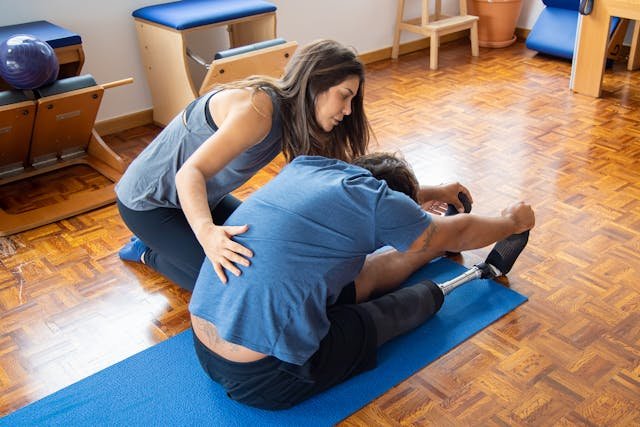
Every user’s needs are unique. Age, activity level, job, family support, and health conditions all influence what kind of prosthetic experience will work best. AI tools can analyze these factors to recommend not just socket size or foot type—but also rehab pace, alignment settings, and even emotional readiness indicators.
By tailoring every detail, smart systems make care more human. They don’t replace expert guidance—they enhance it. This is especially useful in India, where cultural and lifestyle diversity means that one-size-fits-all approaches often fall short.
At Robobionics, our early fit programs are built around personalization. AI helps us listen better, respond faster, and design prosthetics that fit the person—not just the limb.
Building a Scalable Model for Nationwide Care
As demand for prosthetic care grows in India, clinics and manufacturers must find ways to offer quality care at scale—without losing the personal touch. Smart prosthetics and AI are part of the answer. They help automate repetitive tasks, standardize fittings, and track results efficiently. This makes it possible for more people to receive care with fewer delays.
Even training new clinicians becomes easier with smart tools. Data-backed systems and real-time feedback help them learn faster and make better decisions. This supports growth across the entire prosthetic care network.
Conclusion
The early days after an amputation are some of the most important in a person’s recovery. What happens during this stage can shape their comfort, mobility, and confidence for years to come. That’s why early fit prosthetic solutions must be done right—and today, AI and smart prosthetics are making that possible like never before.
From precise socket design to real-time movement tracking, smart technology is changing how users begin their journey. It’s reducing pain, preventing complications, and giving people more control over their progress. Most importantly, it’s helping users feel stronger, safer, and more supported from the very first step.
At Robobionics, we believe this is the future of prosthetic care in India—and we’re proud to be building it today. With the power of AI, advanced sensors, and human-centered care, we are delivering smarter early fit solutions that meet users where they are and guide them toward where they want to go.
If you’re preparing for prosthetic care or want to experience how smart solutions can support your early recovery, connect with Robobionics today.



